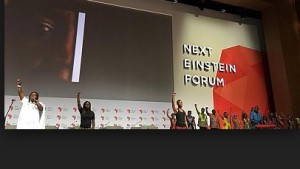. . SUSTAINABLE DEVELOPMENT . .
An article from l’Agence de Press Sénégalaise
The three Senegalese winners of the “Next Einstein Forum”, the international three-day conference that opened Tuesday in Diamniadio (27 km east of Dakar) dedicated to science, technology and innovation, presented on Wednesday [ March 9] the “social importance” of their research.

Organized at the initiative of the African Institute for Mathematical Sciences (AIMS, its acronym in English), the Senegalese Ministry of Higher Education and Research, and the German Robert Bosch Foundation, the “Next Einstein Forum” is a global forum on “issues and challenges of science in Africa.”
Its organizers decided to honor “the 15 brightest young scientists” of Africa, who will have the opportunity to be in contact with the leaders of the continent and the rest of the world, as part of future meetings of the forum.
The program of this international forum includes a presentation of the work of the winners.
The three young Senegalese winners are Mouhamed Moustapha Fall, Joseph Ben Geloun and Assane Gueye.
Mr. Fall was interviewed the press on the occasion of the international conference, which aimed to make mathematics accessible to both educated and illiterate in Africa. To get there, he led a research project aimed at “showing the practical application of mathematics and the benefits of optimization of forms.” “Everyone can do math,” he says.
(Article continued in the right side of the page)
( Click here for the French version of this article.)
How can we ensure that science contributes to peace and sustainable development?
(Article continued from the left side of the page)
Assane Gueye worked on “the search for a scientific approach to security and performance of information and large scale communication systems.” Gueye, who is Director of Research of the Professional Institute for IT security, an institution based in Dakar, develops computer models that should enable the prediction of “global behavior”. “The risks of catastrophic events can be managed and mitigated. And the effectiveness of control measures can be assessed,” he says in a document received from the organizers of the “Next Einstein Forum.”
Joseph Ben Geloun is interested in “physical mathematics, particularly the quantum properties of matter.” “Today,” he says,” we understand the structure of the atomic model, that is to say what is in the atom: the nucleus, neutrons, protons and elementary particles … ” His work presented in the “Next Einstein Forum” is dedicated to “the geometry of space-time”, a research project that leads Ben Joseph Geloun to question “the predictions of Albert Einstein’s laws, which are slightly wrong “. He received the Young Scientist Award in physics and mathematics from the 2015-2017 International Union of Pure and Applied Physics (Switzerland).
Other winners of the “Next Einstein Forum” are citizens of Uganda, Egypt, Kenya, South Africa, Cameroon, Nigeria and Ethiopia.
Their interests lie in theoretical physics, computer science, hypertension, urban epidemiology, semantic web technology, etc.
The “Next Einstein Forum” opened Tuesday in the presence of Senegalese President Macky Sall and his Rwandan counterpart, Paul Kagame.
The organizers of the international conference say they want to make Africa “a platform for science, mathematics and engineering.”
Kigali, the Rwandan capital, will host the next “Next Einstein Forum” in 2018.